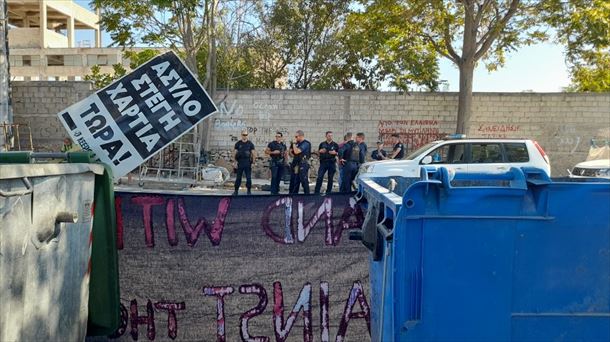February marks two years since war broke out in Ukraine. Meanwhile, fears are growing in the Middle East that the conflict between Israel and Hamas will spread following attacks on merchant ships. EITB Media visits both areas and asks how these conflicts affect us economically.
A. Aramendi Elduaien | EITB media
Wars always have economic consequences for the countries involved. However, in this globalized world, with international economic relations, something that happens at one point on the planet can have consequences hundreds of thousands of kilometers away.
In the words of Iñaki Fernández de Gamboaeconomist and consultant at Maren Consulting, the main effects that these two years of war in Ukraine and the months of conflict between Israel and Hamas have had on our economy have been:high prices, fear and uncertainty“.
One of the biggest expenses that many Basque families and businesses are currently facing is that of mortgages or financial credits. The Euribor, the most common index used to calculate loan repayments in the eurozone, has risen from negative over the past two years to 4.16% in October 2023, the highest level since 2008. This rapid increase has led to repayments of average variable mortgages have become about 340 euros more expensive in two years and the same has happened to the loans that many companies had taken out.
As a result, mortgage signings have collapsed month after month since December 2022. According to data published by the National Institute of Statistics, on average 16% fewer signatures were signed from January to November 2023 than in the same period of 2023. the year.
The rise of the Euribor is closely linked to the increase in interest rates which the European Central Bank has been implementing since July 2022 to tackle war-induced inflation.
He goal of the ECB Keep inflation below 2%. However, in the summer of 2022, this index stood at 10.8% in Spain and 8.9% in the euro zone, mainly pulled down by the wild turnout which suffered from the price of gas, electricity, fuel or agricultural products previously imported from Russia and Ukraine, such as grains, sunflower seeds, agricultural pesticides, etc. Energy prices reached record highs time and time again in the spring and summer of 2022 and then that increase was also channeled to other expenses. The OCU even reports that the shopping basket has become more expensive by 30.8% in two years.

However, the ECB’s measures, OPEC’s decisions and those of governments (Iberian exception, bonuses, VAT cuts, etc.) have helped to slow down and reduce inflation, reaching 3.1% last December. achieved.
The entity led by Christine Lagarde assured that interest rates would continue to rise until they won the battle against inflation and reached 4.50% after ten consecutive increases. the highest level in the past twenty years, where it has remained since October. At the moment, the ECB claims to have no timetable for cutting rates.
Despite inflation, the price of money and uncertainty, the Basque economy has weathered the storm the war quite well, with GDP and employment growth over the past two years.

The economist Fernández de Gamboa explains that what happened was a “soft landing“, that is, the economy has cooled down little by little without stopping abruptly. According to him, in the context of this soft landing, the This year too, growth will be very small.
In this sense, almost half of economists believe that the Basque economy will deteriorate in 2024, according to the Ekonometro 2023 report. The latest report from Laboral Kutxa, on the other hand, states the same about the vision of companies for the next semester. The index that measures this confidence has fallen by 3.5 points (to 45.9), the lowest in the past five quarters.

fear returns
So if analysts were hopeful about the future at the beginning of the fall, the conflict in the Middle East and the Red Sea It has fueled another effect of wars: fear and uncertainty. The war between Israel and Hamas and the subsequent attacks by Yemen’s Houthi militias on merchant ships bound for the Suez Canal have returned to turn on the alarms.
At the moment, the relations of Basque companies with Israel are not very affected and companies such as CAF or Tubacex continue with their usual activities. The most important consequences were the delay in supplies -lack of rubber at, for example, Michelin and the increase in freight rates from shipping companies because many of them have decided to bypass the African continent to avoid attacks by the Yemenis.
The biggest fear, however, is that the war is spreading with the participation of countries such as Iran, the United States and the United Kingdom or extend over time. The latest news is not encouraging in this regard, as the deaths of three US soldiers in the area have fueled tension.
The implications They will be noticeable in the increase in prices of products imported from Asia by sea, and of oil and gas imported from the Middle East.
Source: EITB
I’m Wayne Wickman, a professional journalist and author for Today Times Live. My specialty is covering global news and current events, offering readers a unique perspective on the world’s most pressing issues. I’m passionate about storytelling and helping people stay informed on the goings-on of our planet.



